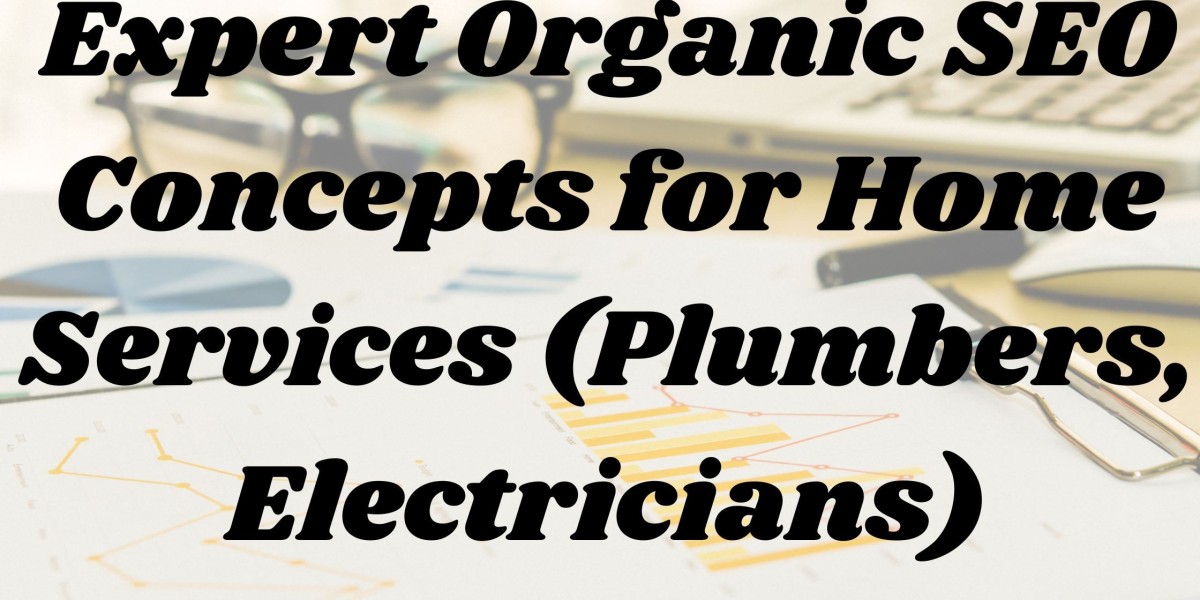Picture this: It’s 2 a.m., and a pipe bursts in someone’s basement. They don’t grab a phone book—they Google “emergency plumber near me.” The same happens when the lights go out or an outlet sizzles ominously. In moments of urgency, customers aren’t browsing page five of search results. They click the top result—usually local, trustworthy, and organically ranked.
For plumbers and electricians, online visibility is no longer optional—it’s survival. And if you’re still relying on word-of-mouth and a few flyers taped to telephone poles, you’re missing the modern customer entirely. This is where expert-level organic SEO becomes your secret weapon. Not the buzzword-laden fluff you see everywhere, but grounded, tactical, results-oriented SEO that builds authority, drives traffic, and gets your phone ringing.
Let’s break it down, step by step, no gimmicks—just what works, and why.
Why Organic SEO Matters for Home Services
The home services industry is hyper-local, trust-based, and timing-sensitive. Unlike eCommerce or tech, you're not convincing someone to buy a product they don’t need. You’re showing up at the exact moment they do—and convincing them you are the safest bet.
Organic SEO Agency does three critical things for plumbers and electricians:
Visibility When It Counts: Organic listings appear when people are actively searching for help. These aren’t cold leads—they're boiling hot.
Trust Without Paying for Every Click: Unlike paid ads, organic rankings signal credibility. People trust Google’s top results more than any flashy advertisement.
Sustainable, Long-Term Results: While ads stop the second your budget runs dry, organic rankings compound over time, giving you ROI that scales.
In industries where one phone call equals hundreds of dollars in revenue, organic SEO isn’t just a marketing strategy—it’s a business essential.
Understanding the Home Services Customer Journey
Your customer doesn’t wake up thinking about pipes or wiring. They think about problems. Drips. Flickers. Sparks. And their journey, whether residential or commercial, often unfolds like this:
Trigger Event: Something breaks or feels off. Panic sets in.
Immediate Search: They reach for their phone and Google the issue.
Shortlisting Providers: They check the top results—especially those with reviews and a local address.
Decision Time: They call the first one that looks credible, has strong reviews, and clearly solves their problem.
This isn’t a leisurely scroll. It’s decisive, emotional, and driven by immediate need. Your SEO strategy must reflect this urgency. You need to be visible, relevant, and trustworthy—instantly.
Core Organic SEO Strategies for Plumbers and Electricians
To win at SEO in the home services space, your approach needs to be precise and multi-layered. Let’s drill into the components that matter most.
Local Keyword Research
You’re not targeting global audiences. You’re targeting neighborhoods, zip codes, and cities. Generic keywords like “electrician” won’t cut it. You need to drill down to “24-hour electrician in Boston” or “licensed plumber in San Diego.”
Smart local keyword research involves:
Using tools like Google Keyword Planner, Ahrefs, or Ubersuggest to find search volume and intent.
Prioritizing service + location queries (e.g., “emergency plumber Toronto”).
Looking at competitor keywords and customer queries in Google’s “People Also Ask.”
Understanding what your customers actually type into Google—especially in emergencies—gives you the language to rank where it counts.
On-Page Optimization
Every page on your site must do two things: help Google understand what it's about, and help the visitor trust you enough to pick up the phone.
Key on-page elements include:
Title Tags & Meta Descriptions: Be clear, specific, and location-focused.
Header Tags: Use structured headers to guide both bots and users.
Service Pages: Have individual pages for each service and each location.
NAP Consistency: Your Name, Address, and Phone number must be identical across all pages and platforms.
Don't keyword-stuff. Google’s smarter than that. Write like a human, optimize like a strategist.
Google Business Profile Optimization
This is your digital storefront—and it's free real estate on Google’s SERP. Yet too many home service pros leave it half-baked.
Here’s how to make it a conversion machine:
Claim and verify your listing.
Choose the most accurate categories (e.g., “Plumber,” “Electrician,” “Emergency Electrician”).
Add service areas, business hours, photos, and real-time updates.
Enable messaging and booking.
Encourage and respond to reviews.
Google heavily favors well-maintained profiles. It’s often the first impression. Make it count.
Content Marketing for Trust and Authority
People don’t just want services—they want solutions, fast. If your blog or service page answers their question better than anyone else, Google rewards that.
Content should include:
FAQs: “What to do if your circuit breaker keeps tripping?”
How-to Guides: “How to shut off water before a plumber arrives.”
Videos: Quick, helpful visual content builds trust fast.
Case Studies: Real jobs, real outcomes—pure gold for credibility.
You’re not just selling a fix. You’re selling peace of mind. Your content should reflect that.
Technical SEO Essentials
Your site could be the Mona Lisa of content, but if it loads like dial-up, you’re out of luck. Technical SEO ensures that Google can crawl and index your site—and users can access it quickly.
Focus on:
Mobile Responsiveness: Most emergency searches are from phones.
Fast Load Speeds: Use tools like PageSpeed Insights to optimize.
Secure Site (HTTPS): Non-negotiable.
Crawlability: A clean sitemap and robots.txt file are crucial.
Structured Data: Schema markup helps Google display rich snippets like reviews, hours, and locations.
Think of technical SEO as the plumbing of your website—unseen but vital.
Local Link Building Strategies
Local backlinks validate your presence in the community and help search engines understand your relevance. But forget spammy tactics—think strategic partnerships.
Effective local link-building ideas:
Sponsor Local Events or Teams: These often come with .org or .edu backlinks.
Collaborate with Other Local Businesses: Cross-promote with roofers, HVAC companies, etc.
Submit to Local Directories: Yelp, Angie’s List, HomeAdvisor, BBB.
Guest Blog on Local News or Industry Sites: This builds authority and traffic.
Links from local and niche-relevant sites are worth far more than random directories from across the globe.
Reputation Management and Online Reviews
Would you hire a stranger with zero reviews to fix a gas leak? Probably not. The same logic applies to your potential customers.
A strong reputation means:
More clicks.
More trust.
Higher conversion rates.
To manage reviews effectively:
Ask for reviews after every job—politely and consistently.
Respond to all reviews, good or bad.
Handle negative feedback with professionalism.
Display reviews prominently on your site and GBP.
Google takes reviews into account for local rankings, and customers rely on them as social proof. They’re not optional—they’re fuel.
Tracking and Measuring SEO Success
What you don’t measure, you can’t improve. You don’t need to become a data analyst, but you do need to track what’s working.
Use tools like:
Google Analytics: See where traffic comes from and what actions users take
.Google Search Console: Monitor rankings, indexing, and technical health.
Call Tracking Software: Attribute leads to specific pages or keywords.
Heatmaps (like Hotjar): Understand user behavior visually.
Measure KPIs like:
Organic traffic growth
Keyword rankings
Conversion rate (calls, form fills)
Bounce rate
Review count and rating average
This isn’t vanity. It’s your business dashboard.
Common Mistakes to Avoid
Organic SEO for home services isn’t rocket science—but it is precise. Here are landmines to dodge:
Neglecting Mobile Optimization: Your users are on phones. Full stop.
Overusing Broad Keywords: “Plumber” is useless without location and intent.
Ignoring GBP: Unoptimized profiles get buried.
Publishing Thin or Duplicate Content: Google penalizes both.
Inconsistent NAP Info: Confuses both users and bots.
Not Following Up on Reviews: Silence can cost you trust.
Remember, most SEO failures don’t happen from doing nothing—they happen from doing the wrong thing consistently.
Final Thoughts
The online battleground for home service pros isn’t about who has the flashiest website or the biggest ad spend—it’s about who shows up first, looks credible, and earns trust fast. That’s the magic of expert organic SEO: a blend of strategy, execution, and authenticity.
If you're a plumber or electrician looking to dominate your market, it’s time to move beyond the basics. You're not just fixing wires or pipes—you’re building a local empire, one click at a time.
And if you're serious about climbing the ranks and staying there, partnering with an experienced Oxford SEO agency might be the smartest move you make this year.
Because when pipes burst and lights go out, you want to be the first call—not the forgotten option.
FAQS
1. What is organic SEO, and how is it different from paid advertising for home services?
Organic SEO involves optimizing your website and online presence to appear naturally in search engine results—without paying for each click. Unlike paid ads, which disappear once your budget runs out, organic SEO builds long-term visibility and trust by improving your site content, structure, and local authority.
2. How long does it take for organic SEO to work for plumbers and electricians?
Organic SEO is a marathon, not a sprint. While minor improvements can show in a few weeks, meaningful results—like higher rankings and increased leads—typically take 3 to 6 months. But the payoff is worth it: stable rankings and compounding returns.
3. Do I really need separate service pages for each location I serve?
Yes, absolutely. Creating individual, optimized pages for each city or neighborhood helps Google understand your geographic relevance. It also improves your chances of showing up in local searches like “Electrician in Charlotte NC” or “Plumber near Lincoln Park.”
4. Why are Google Business Profile reviews important for local SEO?
Reviews act as social proof for both Google and potential customers. Google uses them as a local ranking factor, and customers rely on them to assess credibility. A steady stream of honest, positive reviews boosts both visibility and trust.
5. Can I do SEO myself, or should I hire an expert?
You can definitely start with the basics on your own—like optimizing your Google Business Profile or writing blog content. But for advanced strategies like link building, technical audits, and competitive keyword research, hiring an expert or partnering with an organic SEO agency can save time and deliver stronger, faster results.









